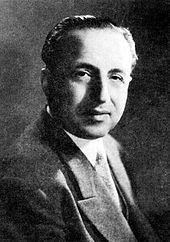Bashir al-Azma
Ahmed Bashir al-Azma , ( Arabic بشير العظمة, DMG Bašīr al-ʿAẓma ; * 1919 in Damascus , Vilâyet Syria ; † 1992 in Damascus) was a Syrian doctor and politician. From April 16 to September 14, 1962, he was Prime Minister of the Syrian Republic and Minister of Health of the United Arab Republic .
Life
The Sunni Azma was born in Damascus and grew up there.
Al-Azma studied medicine at Damascus University . He completed his further medical training in Paris . Al-Azma became a university professor at his alma mater during his career. In 1958 he was appointed Minister of Health of the United Arab Republic by Gamal Abdel Nasser . However, he became a prominent critic of Nasser and the Union, who he accused of perverting the idea of Arab nationalism through authoritarianism and the suppression of democratic processes.
On March 16, 1962, he was appointed Prime Minister by President Nazim al-Qudsi . Al-Azma was supposed to satisfy the officers involved in the coup against the United Arab Republic and push back the influence of the Nasserists. Al-Azma advocated restoring the 1950 constitution and dismissed numerous Nasser supporters from public office. However, his cabinet also contained two ministers from the socialist Baath party . Al-Azma resigned after about six months. However, he remained present in government circles and served as an advisor to Prime Minister Chalid al-Azm .
Bashir al-Azma was one of several prime ministers who wanted to keep Syria out of the East-West conflict . On April 22, 1962, Azma declared on Radio Damascus that Syria's foreign policy would be continued on the basis of the principles of neutrality and non-alignment with military blocs, non-participation in the Cold War and respect for the principles of the UN Charter .
After the military coup in 1963 and the takeover of power by the Ba'ath Party, al-Azma was dismissed from all political offices. The Revolutionary Command Council forbade him from any further political activity by withdrawing his civil rights. Bashir al-Azma continued to work as a doctor in Syria. In 1991 he published his memoirs under the title The Generation of Defeat Between Union and Secession .
Individual evidence
- ↑ a b c Sami Moubayed: Steel an Silk - Men an Women who shaped Syria 1900-2000 , Seattle, 2006, p. 192f
- ↑ Shalom, Zakai. Israel's Nuclear Option. Sussex, Sussex Academic Press. 2005.
| personal data | |
|---|---|
| SURNAME | Bashir al-Azma |
| ALTERNATIVE NAMES | Ahmed Bashir al-Azma (full name); بشير العظمة (Arabic) |
| BRIEF DESCRIPTION | Syrian doctor and politician |
| DATE OF BIRTH | 1919 |
| PLACE OF BIRTH | Damascus , Vilayet Syria , Ottoman Empire |
| DATE OF DEATH | 1992 |
| Place of death | Damascus , Vilayet Syria |

